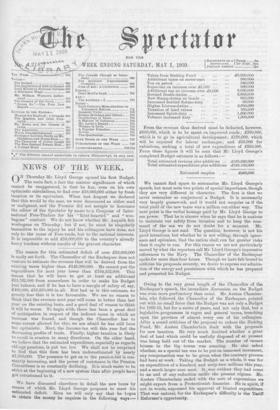The reason for this estimated deficit of over £16,000,000 is
easily set forth. The Chancellor of the Exchequer does not venture to estimate the revenue that will be derived from the existing taxes higher than 2148,390,000. He cannot put the expenditure for next year lower than £164,152,000. This means that he will have to get at least an additional £15,762,000 from somewhere in order to make his Budget just balance, and if he has to have a margin of safety of, say, £488,000, £16,250,000 in all. But bad as is this estimate, we greatly fear that it is too favourable. We see no reason to think that the revenue next year will come in better than last year on tho existing basis, and a good deal of reason to think it will be worse. To begin with, there has been a great deal of anticipation in respect of the indirect taxes in which an increase was feared, and though the Chancellor has to some extent allowed for this, we are afraid he has still been too optimistic. Next, the Income-tax will this year feel the decreasing profits of trade. Finally, higher taxation is likely to result in evasion in many directions. On the other hand, we believe that the estimated expenditure, especially as regards Old-age pensions, is put too low. We shall not be surprised to find that this item has been underestimated by nearly £1,000,000. The pressure to get on to the pension-list is con- stantly increasing, and the power of resistance in the Pension Committees is as constantly declining. It is much easier to be strict at the beginning of a new system than after people have got accustomed to it.










































